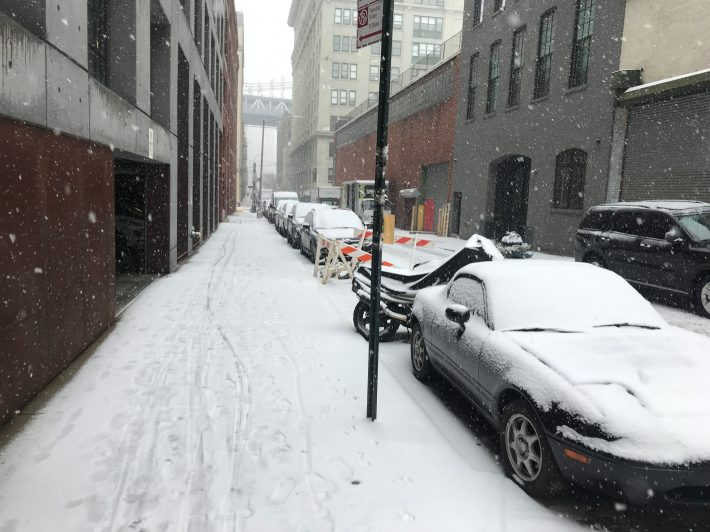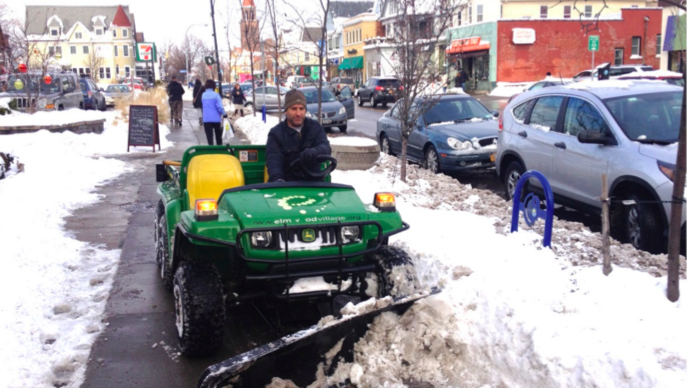It's that time of year, where you see people walking in the street because the sidewalks are full of snow, or you have to brave death and do it yourself.
It's one of the more remarkable double-standards — or inequities — in transportation: Clearing streets of snow is a non-negotiable priority for public agencies, but safe routes for pedestrians are left to a piecemeal private system that mostly fails.
We wanted to highlight a couple of cities that are doing more than most to keep sidewalks clear for pedestrians. The good news is, more cities are starting to recognize clear sidewalks as an important quality-of-life and equity issue that deserves public support.
Rochester, New York
Rochester is a clear leader. The city plows all 878 miles of sidewalks whenever it snows four inches or more.
The Democrat and Chronicle reports that the city farms the job out to private contractors, many of whom are farmers, whose work is at a lull during the winter months. The service is paid for by a fee added to property tax bills that is based on the length of the sidewalk associated with the property. The local blog, Rochester Subway, reports it costs the average homeowner about $40 per year.
Burlington, Vermont
Burlington has one the best snow-removal policies we could find. The city clears sidewalks using public equipment and staff (parks workers). Unfortunately, sidewalks are cleared only after all the roads.
It sometimes takes as long as 48 hours to clear all the sidewalks, according to City Hall. In the meantime, the city prioritizes major pedestrian corridors.
The Twin Cities
Both Minneapolis and St. Paul require homeowners to clear sidewalks. But if they do not — and the city receives a complaint — workers will clear the sidewalks and bill the homeowners or landlords. According to MPR News, about 1,000 St. Paul homeowners and 750 Minneapolis homeowners were billed for shoveling in 2013.
But the process takes a long time. First, the city will write a letter. The fine is $150. It takes about three days for the sidewalks to eventually be cleared, said Bill Lindeke, a local urbanist blogger.
But Minneapolis has been studying taking over sidewalk shoveling from residents. Public Works estimates it would cost between $4.5 and $6 million a year to plow sidewalks four to five times per year. A more continuous plowing schedule, including plowing at lighter snow levels, could cost as much as $20 million a year — and that's after about $5 million in upfront costs for equipment.
The study follows a campaign by the advocacy group Our Streets Minneapolis. Minneapolis has been studying Rochester's program for inspiration.
The group's president Maria Wardoku told Streetsblog that when it snows, sidewalks in Minneapolis are "inconsistent."

"You’ll find some sidewalks that are cleared well and some that are not cleared at all on the same block," she said. "You can’t really feel confident if you’re pushing a stroller or carrying a wheelchair that you’ll be able to get safely to your destination."
Another problem is huge snow piles at intersections left behind by plows.
"You’re literally climbing over a mountain of snow it may be three feet high," said Wardoku.
Wardoku said she can scale the detritus since she's young and able-bodied. But many people with additional mobility barriers are severely impacted.
"We see people who are effectively trapped in their homes for weeks or maybe months at a time: seniors who are worried about falling, people who have other mobility challenges really can’t particulate fully in our community for many months," she said. "We see that as really limiting our city."
Our Streets Minneapolis is asking supporters to reach out to City Council members and push for the sidewalk plowing funds to be included in the 2020 budget.
Syracuse, New York
Meanwhile, Syracuse has been making an effort to better address the issue.
Mayor Ben Walsh advanced a plan to plow 40 high-priority miles of sidewalk this year. However the city has had trouble finding contractors to complete the job. The city has budgeted about $170,000 for the project, but negotiations with a contractor fell apart over concerns about liability for damaged sidewalks, according to Syracuse.com.
UPDATE: Syracuse officials tell us that the pilot is now live and began in January. A 40-mile priority network of sidewalks is being cleared after 3 inches of snow. The routes were selected by local planners. The cost for the program is capped at $170,000.
Duluth, Minnesota
Duluth is a rare city that takes full responsibility for clearing its sidewalks. However, the city does not seem to be able to do a thorough job. Last fall, city leaders discussed removing the requirement, calling it "overwhelming" and instead focusing on priority routes near schools, bus stops and major pedestrian corridors, according to the News Tribune.






